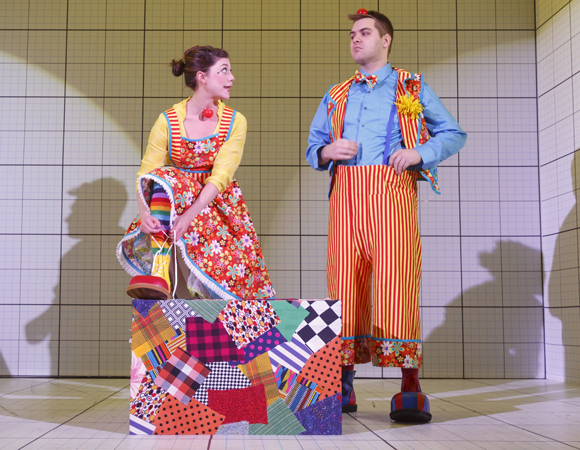Love and Information

(© Joan Marcus)
A man and a woman sit on a checkered blanket on a sunny afternoon in the park having a picnic of sorts, perhaps a first date. She’s drinking wine and doing all the talking as he sits listening, a bemused smile on his face. Gradually, his smile grows confused. "I hold the bird in my left hand and quickly cut off its head with a pair of scissors," she says as he goes pale, "and I drop the body in a bucket and take the head and peel back the skin and cut round the skull and there’s the brain…" Our man looks as though he’s about to run for the hills.
Such is the nature of dating in 2014, a subject briefly touched upon in Love and Information, a play — if you can call it that — by Caryl Churchill, being presented courtesy of New York Theatre Workshop at the Minetta Lane Theatre. Under the direction of James Macdonald, this disorienting work is a collection of 57 short, unrelated pieces performed by 15 excellent actors in a doorless, five-sided cube (designed by Miriam Buether) resembling graph paper.
Some of the playlets are great, some not so good, some emotional, some boring. None of the pieces relate to one another or share characters (as Churchill notes in the published script, "The scenes can be played in any order within each section"). They start and then they’re over, in some cases after a single line. Others go on for what feels like an eternity. Churchill seems to be responding to how, in this day and age, we’re so bombarded by immeasurable amounts of stuff that our attention spans have decreased to a point where we can’t focus on anything. The result is the theatrical equivalent of going through your Netflix queue, watching any movie for five minutes, and then starting a new one, no matter how much you enjoyed what you were previously viewing.
It’s an audacious tactic from one of the most consistently audacious English-language playwrights — an author who explored womanhood in Thatcher-era England through a dinner party between historical figures (Top Girls), imagined the relationship between America and the U.K. as a lopsided gay love affair (Drunk Enough to Say I Love You), and not only titled a pro-Palestinian drama Seven Jewish Children, but subtitled it "A Play for Gaza."
Does it work? To an extent. In terms of button pushing, Churchill and Macdonald have crafted a brilliant, 110-minute production that is possibly the most startling indictment of life in the era of short attention spans ever. As the scenes flit by, with shell-shocking lighting by Peter Mumford and sound by Christopher Shutt between them, you find yourself more and more wanting to jump out of your skin. But then, when it ends and you hit the street, you realize how little the evening added up to, with a few of the playlets feeling like no more than scribbles on a cocktail napkin.
This isn’t the fault of the 15 actors who infuse every one of their characters with an almost shocking amount of personality — if only we made their acquaintance for a little longer.










